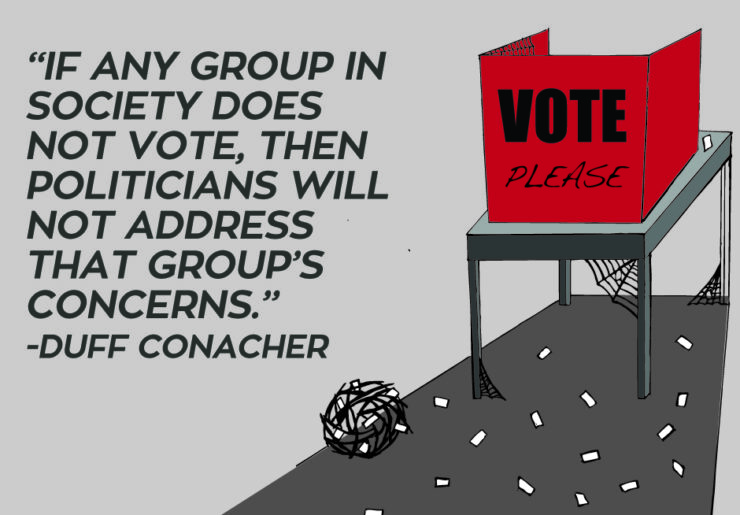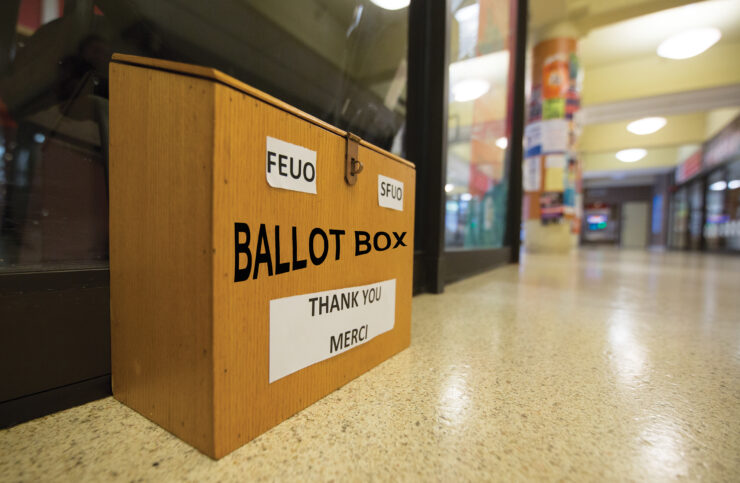Do yourself a favour, and make sure you’re registered to vote
2025 is already shaping up to be a contentious year for Canadian politics, with an impactful federal election slated to occur. With the Prime Minister’s highly-demanded resignation, a Conservative stronghold in the polls, and the aggressive teasing of a certain returning president, it can be difficult to not assume the world is ending and everything in the country is doomed.
I’m not here to convince you that everything is doomed, but I will suggest easing your doom scrolling. I’m not here to tell you all is doomed — your doom-scrolling is doing that for me. Rather, I’m bringing you a bit of hope. I’m here to make sure you’re registered to vote!
For a basic civics course reminder, Canada uses a first-past-the-post model for its federal elections. Although this model maintains its own issues with equitable representation, this means that you are directly electing a Member of Parliament for your riding — not just a vote for your federal leader.
Youth voter turnout has been an issue in Canadian politics for the past 20 years, and it’s not hard to see why. When you’re in school (or just graduated), you have a job, bills, and courses to worry about — who cares about the future of the country when you need to scrounge up money for rent next week?
According to Statistics Canada, the two most common reasons Canadians aged 18-24 did not vote in the 2021 federal elections are “everyday life or health reasons” (42 per cent) such as work or travelling; followed by “political reasons” (36 per cent), meaning a lack of interest in candidates or their platformed issues. And if you can recall, that was a snap election as well.
You, as a student from out of town, might also feel as though your vote holds less weight. Sure you live and work in this city, but you can’t even figure out what classes you need to take next year — much less what you want out of your riding for the next four. How are you supposed to know what your neighbourhood needs, much less five different candidates? You’re thinking of just going home after graduation anyhow.
Let’s be honest — there’s a lot of political contention over nearly every issue that does affect your everyday life. Housing, affordability, immigration (who are affecting your international student friends the most), education, and job opportunities are all issues that I’m sure are already affecting you to some degree. Based on your own experiences, how would you change these? Who deserves special attention?
Would you prefer more timely OSAP payments or student loan relief? Maybe less expensive rent for students in your neighbourhood? These all count as political issues that you can (and should) advocate for, whether at the municipal, provincial or federal level.
Where do I even start? Politics is overwhelming
Start with what you know, or at least what you know you care about. Do you care about the climate and how it’s affecting the country? Or maybe a crumbling health care system that you’ll have to tackle without insurance? You already know what your values are and what issues mean to you most, even if you say otherwise.
Although the actual date of the federal election is undetermined, you should at least take the steps to register yourself as a voter, which is possible as long as you’re 18 and a Canadian citizen. You can check on Elections Canada whether you’re an eligible voter — but make sure you have an appropriate address on hand. If you plan to live in residence, or you’re slated to move out, try to keep that address updated the next time someone asks you about the election. Even if you’re studying abroad, you can update your voter information!
The next step is to commit to your voting method. If you can’t commit to finding a polling station — maybe you’ll have a full day of class or you’re working — you should register to vote by mail (oh hey, updated addresses are important!). You can also vote ahead on advance polling days at your assigned stations or early at any Elections Canada office, once the election is formally called.
There are plenty of resources that can guide you in the right direction for first getting involved with voting, such as this brief overview. The Public Service Alliance of Canada also compares the key issues of each major political party’s platform, so you can get a brief look of how they are committed to different issues.
Politics, especially federal, feel a bit distant for some students as well. But saying your vote does not matter is not true. Whether it’s with the student union elections occurring next month, or the federal contests pending a fall arrival — the importance of your vote cannot be understated.




